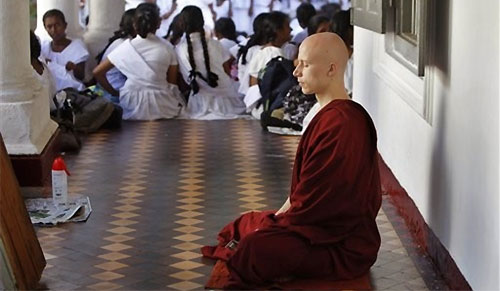|
To Protect Buddhism, practise it
Daily Mirror Editorial May 5, 2012 | |
 Amid national and international crises ranging from the soaring cost of living that has hit the moon, to human rights and reconciliation issues, millions of Sri Lankans will today celebrate the thrice-blessed day of Vesak which marks the birth, enlightenment and parinibbana of the Buddha. Sri Lanka proudly proclaims itself as the home of Theravada Buddhism and we are often told that it is our right and duty to protect this highest and purest form of Buddhism. Vesak today offers us a quiet time of deep meditation to ponder on the reality that the most effective way to protect Buddhism is to practise its basic principles and virtues. Unfortunately we often hear lofty proclamations and pious if not puritanical platitudes especially from political leaders with dubious credentials and sometimes even from those who indulge in deception and hypocrisy by plundering the wealth of the country while preaching that they have come forward to serve the people. Essentially the Dhamma, a way of life preached by the Buddha calls us to a journey of liberative spirituality where we consciously and gradually allow ourselves to be liberated from our slavery to selfishness, self-centredness and greed. The Buddha did this physically, psychologically and spiritually. He gave up his royal privileges, wore a saffron robe made up of pieces of burial cloth picked up from cemeteries, and had no fixed abode. Like the Buddha, unless we also experience the liberation from selfishness and greed, we cannot practise the hallowed precepts of love, compassion and act in a manner that will make all beings happy. If we are selfish we will never be happy. It is only when we act to make others happy that we will be really and truly happy. The Buddha Dhamma teaches us that selfishness and self-centredness are basically self-destructive vices. When we are enslaved to selfishness, even the help we give or the good we do to others has a hidden agenda and we are expecting something in return. If our good deeds are intended to gain publicity or popularity, then that is the only reward we will get and it will pass away soon. Another important teaching of the Buddha was non–violence. By word and deed he proclaimed that hatred ceases not by hatred but by love. The Buddha rejected extremism and stressed the importance of taking the middle path of accommodation and dialogue in conflict resolution. In modern terminology he propagated a win-win concept instead of the winlose process. Source: Daily Mirror - Sri Lanka
|
|